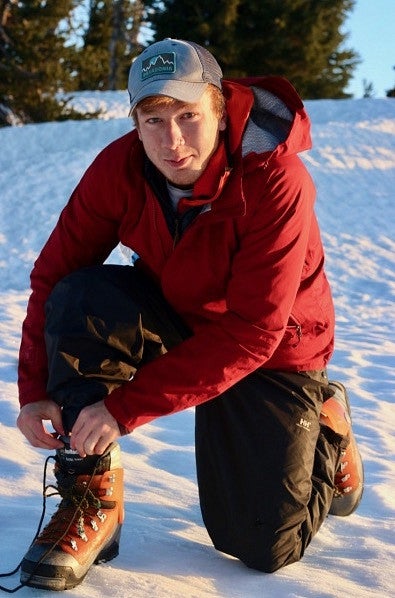
When nominations were being accepted for the Faculty Research Mentor Award, Clark Honors College student Mackenzie Myers decided to organize a submission for his mentor, Professor Mark Carey. Myers, a sophomore and the only undergraduate on Carey's Glacier Lab research team, assembled the other members — PhD and graduate students — to write a paragraph each earlier this year to nominate Carey for the coveted honor.
For the last two years, the Center for Undergraduate Research and Engagement (CURE) at the University of Oregon has funded multiple faculty and student research projects across campus. When Myers submitted his nomination of Carey for the Faculty Research Mentor Award, he also applied to the Summer Undergraduate Research Fellowship (SURF) award, a $4,000 stipend.
Myers’ effort paid off: he and Carey won their awards from CURE in late March, and both winners praised each other’s work.
“Mark is really good about involving us and going out and doing activities,” Myers said. “He definitely deserves it. He’s a great advisor and mentor for me, and also for other undergraduates.”
Carey said that he had no idea his team nominated him.
“First of all, it’s nice that they feel that way. It’s kind of amazing,” Carey said. “Mackenzie is a second-year student, and that he would go and ask the PhD students for help and feel comfortable essentially collaborating on a mini-project; that’s what the whole thing is about.”
Carey said that his Glacier Lab is different than a scientific lab. Everyone there has a general interest in ice, glaciers and climate, but they work on individual projects and come together for feedback and proofreading. Projects range from photojournalism to grant applications. Currently, however, the whole team is collaborating to research glacier melt on Mt. Hood.
“I’ve heard from many of my colleagues: ‘I never, in graduate school, ever had anything like that.’ We talk about the publishing process, and what it looks like and how to navigate it,” Carey said.
Carey is well known around campus for his mentorship, said Josh Snodgrass, anthropology professor and director of CURE.
“We were particularly impressed by how he has so effectively fostered connections between undergraduates and graduate students in his lab, which has led to regular dialogue and exchange, as well as collaborative research,” Snodgrass said.
Since being invited to work with the Glacier Lab, Myers has taken advantage of the opportunities and connections Carey’s group provides.
This summer, Myers will research the representation of glaciers in art, under Carey’s mentorship and with his SURF-awarded funding. He seeks to show the positive connection between people and glaciers, to explore representing their importance without an apocalyptic tone. Myers will mostly research digitally and at the Mazama Mountaineering Center in Portland, where he works as a summer camp coordinator.
Snodgrass said the CURE team had “a lot of incredible applications” to consider this year, but that Myers’ interdisciplinary and important proposal stood out.
Glaciers have both local and global impact, and inspire art, literature and scientific inquiry. Carey and Myers know their importance and CURE’s support brings some attention to their hard work.
-Abbey McDonald, CHC Communications
